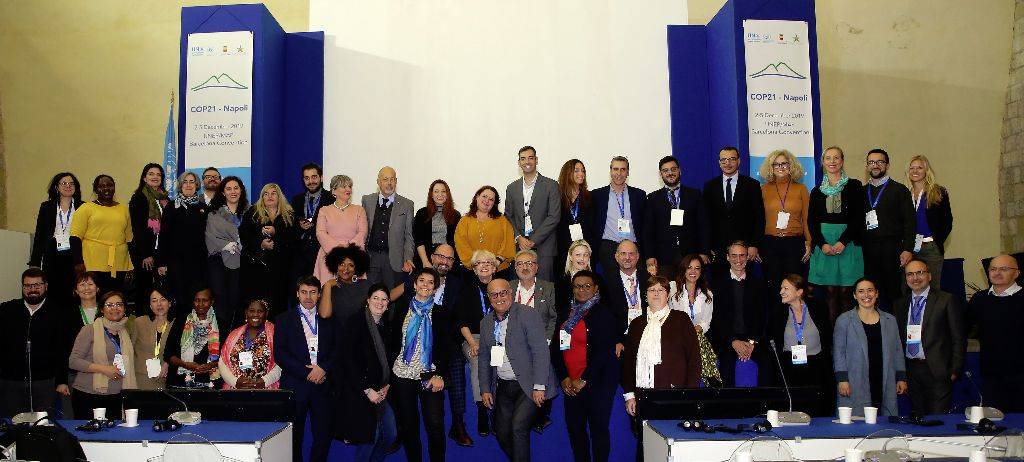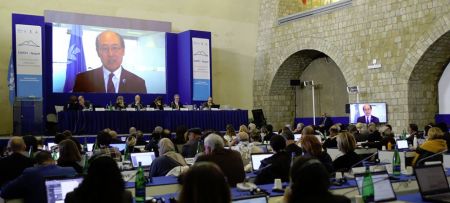The Contracting Parties to the Barcelona Convention and its Protocols concluded their twenty-first meeting (COP21) in Naples, Italy, on 5 December 2019. Ministers and senior officials representing all Contracting Parties - 21 Mediterranean States and the European Union - attended the meeting convened by the Mediterranean Action Plan of the United Nations Environment Programme (UNEP/MAP). More than 300 participants, including civil society and intergovernmental organizations, took part in the negotiations, side-events, exhibitions and panel discussions on the health of the Mediterranean marine and coastal ecosystems.
The Contracting Parties reiterated their commitment to the health of the Mediterranean Sea and coast. The Naples Declaration sums up the strong political support to the UNEP/MAP mandate in four priority areas: marine litter, blue economy, biodiversity and marine protected areas, and climate change. According to Mr. Gaetano Leone, UNEP/MAP Coordinator, the Naples Declaration is “an eloquent expression of political support to the UNEP/MAP-Barcelona Convention system’s role, achievements and plans in responding to the pressing environmental challenges facing the Mediterranean region”.
The COP21 adopted the proposed Programme of Work and core budget of UNEP/MAP for the 2020-2021 biennium. The Contracting Parties also endorsed the launch of preparations for the next UNEP/MAP medium-term strategy (2022-2027).
A roadmap for the proposal of a possible designation of the Mediterranean as an Emission Control Area for Sulphur Oxides was adopted, in line with the terms of Annex VI of the International Convention for the Prevention of Pollution from Ships (MARPOL).
The Contracting Parties adopted thematic decisions pertaining to circular economy, guidelines on the placement of artificial reefs, and tools for Integrated Coastal Zone Management (ICZM).
COP21 also adopted a plan for the preservation of iconic Mediterranean species such as monk seal, sharks and rays and designated four new sites as “Specially Protected Areas of Mediterranean Importance (SPAMI)” in France, Italy, Slovenia and Spain, including an important corridor for the movement of Cetaceans in the Mediterranean.
Adopted by the Contracting Parties in Naples, elements of six regional plans to reduce and prevent marine pollution from Land-Based Sources (LBS) will now complement and strengthen the LBS and Dumping Protocols of the Barcelona Convention.
In addition, the COP21 cleared the publication (in 2020) of the UNEP/MAP State of Environment and Development Report (SoED 2019), which describes the ever-growing pressure on the basin deriving from population growth, climate change, agriculture and fisheries, tourism, extractive industries, and transport.
A ministerial session was organised on 4 December with statements from H.E. Mr. Sergio Costa, Minister for Environment, Land and Sea Protection of Italy, and Ms. Joyce Msuya, Deputy Executive Director of UNEP. The UNEP/MAP Coordinator reported a message from H.E. Mr. Sergio Mattarella, President of the Republic of Italy, wishing COP21 delegates well in their deliberations. A high-level panel discussion on “Protecting the marine environment and coastal region of the Mediterranean: game-changing action for sustainability” took place during the ministerial session. The Panel was divided in two consecutive parts: “Periscope” and “Propulsion”. The former focused on challenges and opportunities that should factor into policymaking to achieve Good Environmental Status in the Mediterranean in the context of sustainable development. The latter took the shape of an action-oriented collective reflection on leverage points that would accelerate the required transition.
The COP21 agenda carried a focus on sustainability with a view for UNEP/MAP to underpin efforts by the Contracting Parties in achieving the 2030 Agenda for Sustainable Development and its 17 Sustainable Development Goals (SDGs).
The outcomes of the COP21 will contribute to the ongoing intergovernmental processes on the ocean, climate change and biodiversity with a focus on the Mediterranean region. Its outcomes will feed into the UNEP marine and coastal Strategy for the 2020-2030 decade.


